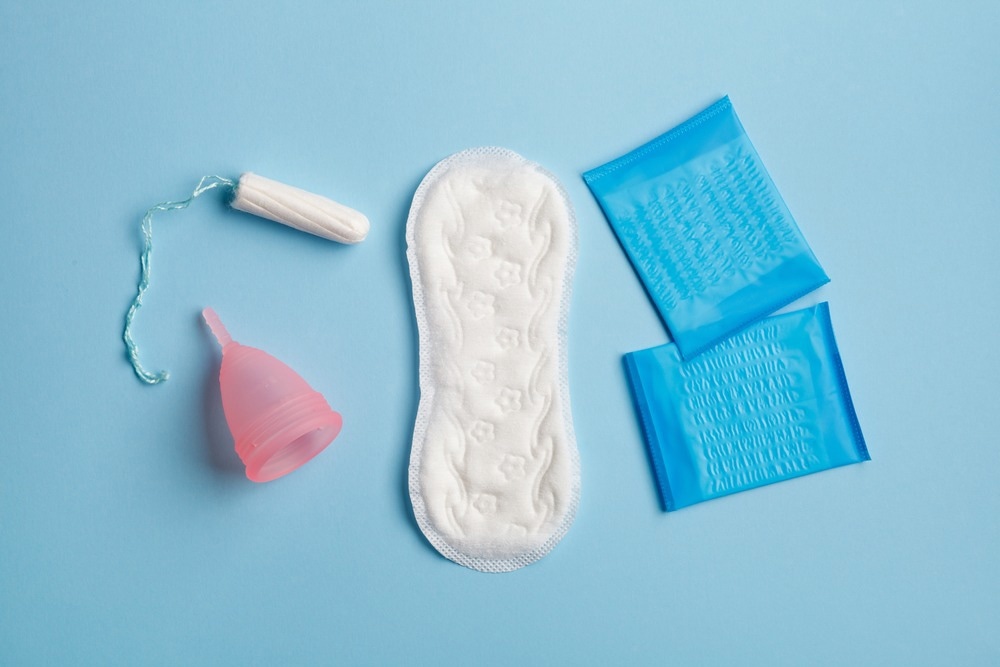Introduction
Period Shaming
Medicalizing or Ignoring Period Symptoms
Preventing Acceptance
Demonizing Natural Processes
Ignoring Menstrual Needs
Overcoming period stigma
Recognizing Normalcy
Social Programming
Improved Sanitary Facilities
Conclusion
References
Further Reading
Menstruation is a completely natural and universal phenomenon, associated with normal female reproduction. However, it is surrounded by negative perceptions, and communication about it, when it occurs, is typically limited to its pain, inconvenience and embarrassment. From the first mention of the term, it is associated with physical and emotional stress and discomfort.

Menstruation. Image Credit: Olly Kava/Shutterstock.com
Premenstrual syndrome (PMS) has become a way for women to talk about the culturally taboo topic of menstruation without shame, and thus create a support group outside the confines of their culture. This is perhaps because society treats menstruation as a shameful thing, and reacts adversely to talking about it.
Period shaming
As one researcher put it, “From our earliest awareness of menstruation until the day we stop, we are mindful of the imperative to conceal our menstrual processes…. Do not discuss your menstruation . . . leave no bloodstains on the floor, towels, sheets, or chairs. Make sure that your bloody flow does not visibly leak through your clothes, and do not let the outline of a sanitary product show.”
A menstruating woman has been treated as an unclean thing in many cultures, often forced to stay out of the communal or family dwelling. The cloths, pads, or tampons used to absorb menstrual blood are shunned, even when new and unused, because they remind the individual of menstruation. Houses or women who happen to expose such sights to others may be avoided. Social norms decree that menstrual blood should be contained and treat blood stains due to leaks as a matter of shame and embarrassment.
Advertisements for sanitary products focus on their ability to conceal the menstrual flow and associated odors, small profile and ability to be disposed of without drawing attention. They emphasize the ability of the product to prevent shame and promote acceptability during the menstrual period. Their wording presents menses as unhygienic and thus something to be properly dealt with to avoid unwanted consequences.
Medicalizing or ignoring period symptoms
Genuine illness linked to menstruation is often passed over as trivial and is often ignored. Women are represented as being emotionally unstable, out of control, irrational and ill during their premenstrual and menstrual periods, and menstruation itself is regarded, in much of social media messages, as a weakening experience.
This period stigma, as it is called by many researchers, is linked to body shaming. Like the latter, it can impact women’s physical and mental health negatively, affect sexual enjoyment and expectations, reduce the quality of life and contribute to diminished social status. This can be seen in the way many cultures insist that women keep out of sight and avoid routine household work, to avoid ritual defilement of the others in the household, during their period, leaving them “feeling trapped, isolated, and powerless.”
Preventing acceptance
Moreover, shame prevents women from talking about menstruation despite the fact that it is universal. Studies have shown that in certain communities, young girls know nothing about menstruation before they have their first period. This lack of communication inhibits the building of connections among women, prevents empathy, and prevents the building of resilience.
In most instances, girls are advised by older women to be silent on this topic except to other older females who are close to them. This may be intended to shield the girls from being shamed by boys or men, who are culturally unprepared to treat such talk with composure. However, this limits the level of knowledge about periods among both menstruating girls and males in the community, and as reinforces the sense of embarrassment about menstruation.
Demonizing natural processes
Social myths about menstruation, dating back to ancient times, have persisted due to the lack of public health communication about this experience. These beliefs are deep-rooted and contribute to the humiliation and stigma surrounding this perfectly normal topic.
Menstruating women in low-resource settings often believe that they may contaminate and/or harm others if they come in contact with them during this time. In addition, the lack of knowledge causes intense anxiety or terror during their first period, adding to the shame.
Ignoring menstrual needs
The lack of sanitary facilities forces millions of girls and women to endure great hardships during their periods. Some use material that cannot be sanitized or have to reuse sanitary products which can cause reproductive tract infections. This is called ‘period poverty’ – “barriers (financial, social, cultural and political) in accessing menstrual products, menstrual education and access to healthcare services” – and hampers the development of countless women.
In other places, girls cannot go to school during their periods, missing 3 months of school every year as a result. Schools in such communities are often unfriendly toward menstruating girls.
Staying home from school during the menstrual days is culturally dictated in many areas, and there is often a lack of protective sanitary equipment and school restrooms equipped for dealing with menstruation. Education is key to empowering women, allowing them to delay marriage until they are self-reliant and providing greater healthcare access. Thus, missing school due to menstruation feeds into a cycle of suppression.
Interestingly, some studies show that menstruating girls themselves contribute to the difficulty they face with facilities at school, by not disposing of the waste correctly, despite repeated instructions. The reasons for this are not clear.

Many women around the world do not have access to safe sanitary products. Image Credit: Alina Kruk/Shutterstock.com
Overcoming period stigma
While women typically talk negatively about menstruation, this need not be so. One way to overcome this shame-induced negativity is to help women recognize the power of the menstrual cycle, in keeping them healthy. For instance, one researcher developed a Menstrual Joy Questionnaire, which, surprisingly, presented many participants with unexpected and previously unrecognized positive aspects of their cycles.
Secondly, while talking about PMS has allowed women to speak about menstruation more openly, albeit in a negative sense, it has strengthened the idea that menstruation-related problems are medical issues that specialists in women’s health should advise on, rather than problems for menstruating women to perceive and cope with by themselves.
Menstruation needs to be recognized as a natural process by those in the medical sector, women themselves, and the rest of the community.
Recognizing normalcy
An important insight into the negativity surrounding menstruation is that “The goal of interventions should be to create and maintain a context that facilitates health, or else interventions are likely to be short-lived and unsustainable.”
Menstruation should be encouraged to be recognized as key to being a healthy woman, and nothing to be ashamed of. It is emphatically not a weakness, but a distinctive female characteristic that signals the ability to bring forth offspring. The need to conceal the blood may still exist out of consideration for the feelings of others, particularly younger people, who are often afraid of the sight of blood, but it should not be in order to hide the fact that one is menstruating.
Social programming
Governmental and non-governmental organizations should implement public education programs that allow men and women alike to understand menstrual physiology. This should focus not only on how menstruation works but on its unique contribution to femininity and fertility.
Such social programming and dissemination of education could produce multiple benefits.
For one, people would have a positive view of menstruation, encouraging it to gain a place of value in female health. The typical teasing and shaming associated with periods could be reduced. A positive male influence could be instrumental in changing social attitudes towards menstruation.
Such awareness would help to dispel myths about uncleanliness associated with menstruation. This would promote social changes that clear the way for women to participate fully in significant activities such as studying, going to school, household tasks and prayer without a sense of shame or non-acceptance.
Improved sanitary facilities
Another type of intervention is directed at providing restroom facilities that cater to this specific need of women, especially to the disposal of used menstrual products. This will avoid the clogging of latrines with these products, which in turn rouses more aversion towards menstruation, as well as allowing safe and quick disposal of used products rather than women having to carry them around with them.
Researcher Isha Bell comments on the broad use of designing buildings around the needs of women and children, “If sanitation programs are designed for female needs, they will also serve male needs and disabled needs.”
By providing such restrooms, menstruating women are enabled to remain comfortable and change their sanitary products conveniently and hygienically. Women and girls who dispose of their waste products improperly should be identified and the underlying reasons explored.
This will go a long way in promoting a willingness to undertake further education or enter full-time gainful employment, thus helping to equalize gender opportunities. Coupled with such steps, women must be empowered to voice their own concerns and needs.
Share a better period | Period poverty | ActionAid UK
Conclusion
Scientists and public figures should recognize and promote the fact that having a period is neither negative nor unnatural. The social construct responsible for such attitudes must be acknowledged and recognized to be the foundation for much oppression of women’s social status.
A celebration of what menstruation signifies, physiologically – the continuing harmony of the brain and the ovaries to perpetuate the feminine hormone-driven reproductive physiology – would go a long way in casting out this negative construct, and replacing it with one that puts value on this deeply female experience, and in fact, one which is essential to human reproduction.
References
- Litman, J. (2018). Menstruation Stigma Must Stop. Period. International Health. Retrieved from https://pha.berkeley.edu/2018/06/05/menstruation-stigma-must-stop-period/. Accessed on July 25, 2022.
- McCammon, E. et al. (2020). Exploring Young Women’s Menstruation-Related Challenges In Uttar Pradesh, India, Using the Socio-Ecological Framework. Sexual and Reproductive Health Matters. https://doi.org/10.1080/26410397.2020.1749342. Retrieved from https://www.tandfonline.com/doi/full/10.1080/26410397.2020.1749342. Accessed on July 25, 2022.
- Medina-Perucha, L. et al. (2022). Menstrual Health and Period Poverty Among Young People Who Menstruate in The Barcelona Metropolitan Area (Spain): Protocol of A Mixed-Methods Study. BMJ Open. doi: 10.1136/bmjopen-2019-035914. Retrieved from https://bmjopen.bmj.com/content/10/7/e035914. Accessed on July 25, 2022.
- Benshaul-Tolonen, A. et al. (2020). Period Teasing, Stigma and Knowledge: A Survey of Adolescent Boys and Girls in Northern Tanzania. PLoS One. https://doi.org/10.1371%2Fjournal.pone.0239914. Retrieved from https://www.ncbi.nlm.nih.gov/pmc/articles/PMC7592731/. Accessed on July 25, 2022.
Further Reading
Last Updated: Aug 3, 2022